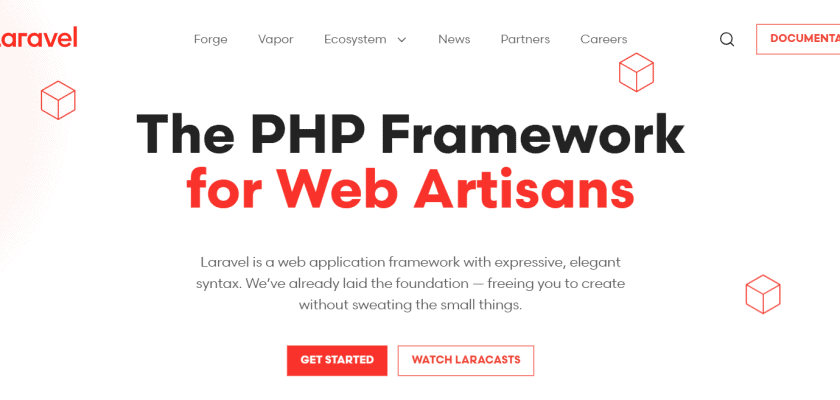Why is Laravel best for Building Scalable Web Applications?
- If you compare Laravel with other PHP frameworks, it is known for easy integration with AJAX (asynchronous request helping data load from server) calls.
- It helps with smooth modern web application development, as its caching system stores a good number of cached items.
- Everyone loves personalization nowadays; it stands out for that very reason. Combined with neat coding practices and impressive syntax, it is like a dream framework for businesses around the globe.
- It is preferred by developers, as it gets along well with the full of opportunities and extensive full stack model.

Why do entrepreneurs prefer this PHP framework for web development?
As we discussed above, it was developed for user authentication and authorization (the key inspiration). Therefore, it offers easy access control for authentication logic and resources, helping businesses manage authentication without breaking a sweat. For site owners, this translates to user data protection (a trending concern among the business community) and management.
What do entrepreneurs love the most? The detailed, beautifully crafted emails. Laravel knew this pain point and designed the functionality of sending customized emails with all the details, including pictures and more, without introducing any complexities. Laravel’s SwiftMailer library helps set the API for individual accounts for prompt communication regarding any minor to major user activity.
Adding further to a sense of security for businesses. Laravel offers security to your web applications against security risks considered severe, including SQL injections, cross-site scripting, request forgery, remote code execution, and clickjacking etc.
Following the MVC (model-view-controller) architecture, laravel helps separate presentation code and business logic code. This helps developers refine user interfaces without disturbing the core business logic. The result is improved customer satisfaction and retention without risking the core functionality of the web app. So, if you are sitting tight with your interface challenges just because you don’t want to disturb the core business. You can hire laravel developers to revamp the interface of your existing web apps based on user feedback and business requirements without changing the foundation.
Laravel can help you run multiple tasks in the background with a built-in queue system (an API), it is beneficial where users do not require any immediate response. There is another in-built feature called Laravel Crone Job (a task manager), which helps you create custom scheduled tasks.
Top rated features of Laravel
Localization: Laravel makes it easy to build multilingual applications. Using the trans() helper, you can access strings in different languages, making your app accessible to a global audience.
Template Engine: There is another built-in feature, a lightweight template engine, which makes creating dynamic layouts a breeze. With features like multiple widgets that integrate CSS and JS, Laravel simplifies the process of designing engaging web applications.
Validation: Laravel’s built-in validation system makes handling user input effortless. With its ValidationRequest trait, it streamlines HTTP request validation and automatically displays error messages in your views when needed.
Artisan: A powerful command-line tool called Artisan is designed to make repetitive programming tasks easier. It is perfect for creating database structures, automating workflows, and generating skeleton code
for migrations. This helps developers save time.
Eloquent ORM (Object-Relational Mapping): Eloquent ORM is a tool that lets developers work with databases using PHP syntax instead of writing complex SQL queries. This makes managing database interactions faster and more developer-friendly.
File System: Laravel supports both local and cloud file storage options, like Amazon S3. You can easily switch between these systems by adjusting the configuration in the config/filesystems.php file to fit your needs.
Libraries & Modular System: Pre-installed and object-oriented libraries are another reason that makes Laravel a top preference. For example, its authentication library is packed with features like active user tracking, Bcrypt hashing, password resets, CSRF protection, and encryption, all easy to implement for developers.
Reverse Routing: The reverse routing feature is known for linking routes and URLs dynamically. This means any changes to routes automatically update relevant links across the app, reducing maintenance effort and errors.
Database Seeding: Populating your database is simple with Laravel, which helps test data using database seeding. This feature is handy for application testing and ensures consistent test environments.
Application Logic: Laravel structures application logic using controllers and route declarations, making it straightforward and maintainable. The framework’s syntax is inspired by the Sinatra framework, offering clean and efficient implementation.
Migration System: Laravel’s migration system is a game-changer for database management. Instead of writing raw SQL, you can use PHP code to create tables, indices, and columns. Updating existing tables is as simple as running a new migration—no need to recreate the entire table.
Conclusion
What do Startups and Enterprises have in common? Good-looking, secure, and fast modern web application development. Well, irrespective of business size or industry, anyone looking for web app development will appreciate the modern and easy-to-use features of Laravel. If cost is the factor concerning you or the lack of an inhouse team, you can hire offshore laravel developers and get started with building your web app without any wait. Hope this helped you with all the reasons you were looking for to decide on the right framework.
Author Bio: Nathan Smith is a Technical Writer at TechnoScore with extensive knowledge in software documentation, API guides, and user experience. Mastering HTML, CSS, JavaScript, and tools like JIRA and Confluence, Nathan’s expertise covers Application Development, Software Engineering, AI/ML, QA Testing, Cloud Management, DevOps, and Staff Augmentation (Hire mobile app developers, hire WordPress developers, and hire full stack developers etc.).

